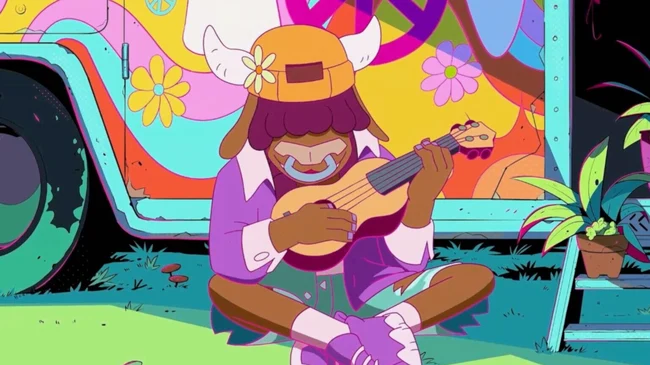Table of Contents Show
Friends vs Friends can be quite difficult to play 1v1 without properly strategizing. Between cards, characters, and maps, it can be quite overwhelming for newer players to pick up and play. And if you’ve started but need some tips on how to hone your skills, look no further than here.
Friends vs Friends Strategy Guide
Creating a Deck
The deck is the bread and butter of the game, but it shouldn’t be harder to make than bread and butter. The starter deck is fairly straightforward and gives you direct counters to each and every basic card everyone owns. You can earn and buy booster packs with in-game currency that give you cards and upgrade the cards you already have. Generally, having more cards opens more opportunities and different strategies for you to use.
To start, make sure you are adding cards that give you a direct advantage in combat and have direct counters to other cards. Also, get rid of any dupe cards that have the same effect (like helmet with smaller head) to save room for more cards that you can stack against your friend. Lastly, when you have enough cards, switch out cards you barely use with newer, stronger cards.
Pro tip: try to put as few cards as possible in your deck so you have a higher chance of drawing something you want.
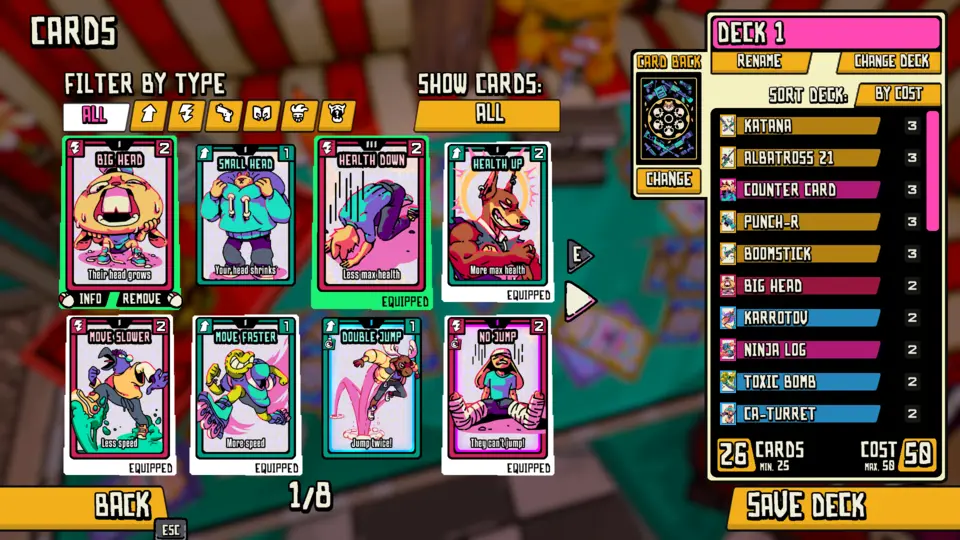
Knowing your Characters
Another thing about decks is that you should make one for each new character you plan on playing. Since each character has their own perks, you can centralize your decks around that them.
Here are my personal choices for some characters:
- Donnie B. (my beloved) – Based around health, I give her all my health and hard hitting weapons like the Punch-R and Boomstick. More health = riskier plays you can make without being killed.
- Spike Remington – Harder hitting bullets along with debuffs is a great way to whittle down your friend. If you have a steady aim, then cards like No Jump, Steel Bullets, and Smaller Mag is a great way to use your increased damage.
- DJ Newton – Better accuracy with high spread weapons is a brutal combo when placed in the right hands. Make sure to equip the Boomstick, Brasshopper, and FK-82 if you have them. Otherwise, use debuff cards that specialize in long ranges like Pixel-Vision or Small Mag if you have them.
There are so many playstyles and decks you can use for each character, so play around with the cards and find decks that feel right for you.
(Don’t forget that you can make different decks and save each one individually!)
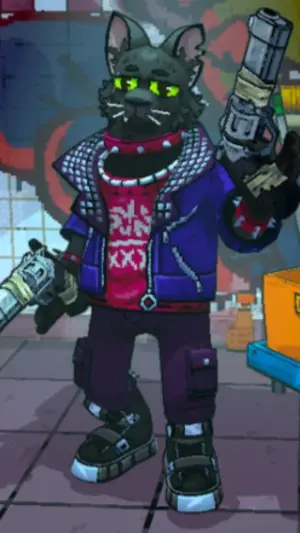
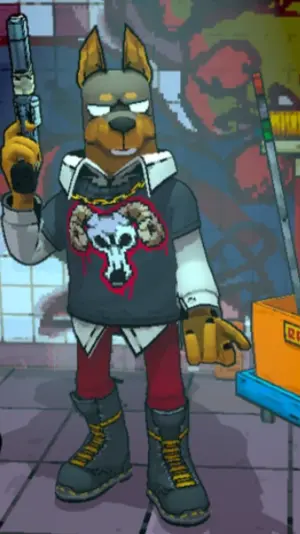
Starting the Round
The first thing you should do when starting the round is to scroll through your cards and pick out one or two cards you want to use. Don’t stack too many cards right out the gate, because you can give your friend the advantage in the next couple of rounds if you don’t have anything to counter their cards with. Alternatively, you can keep all your cards and counter your friend with any cards you may have in your deck.
In general, it’s better to counter in the beginning of the game while holding on to better cards and combos for mid to late match. Use combos them to gain the advantage early on in the match. If ahead by a few rounds, go wild and use any combination of cards you feel like using.
Another thing to note is that you draw 5 cards at the beginning of the round. After that, you draw 3 more each round. It’s best to hold onto two or three cards in case other cards show up that combo with them. Speaking of combos…
Creating (and Spotting) Card Combos
Card combos are THE THING you have to watch out for when playing a match. The basics of a combo are two cards that, when played, gives you a massive advantage over just playing each one individually. When creating a deck, you should keep an eye out for new cards that can be used in conjunction with cards you already have. An example would be something like the energy drink and faster movement that can help close the distance between you and the opponent and even the shotgun to utilize the close range you created.
Here are some basics that I recommend:
- Ninja Log and Boomstick – The next time my friend shoots me, I get as close as possible and unload as many shells as I can with my newfound close-distance
- Laika, No Jump, and Bullet Time – When used correctly, No Jump lets me predict how my friend moves and Bullet Time allows me to get a few good shots at my friend’s head, usually winning me the game
- Big Mag with ANY weapon (and Steel Bullets) – Big Mag is OP when used with something like the Brasshopper or Punch-R, but any weapon will do. Pair that with Steel Bullets, as long as you hit your shots, and you have a recipe for winning.
Of course, these are only a few combos you can use when in a match. And since getting three cards in a row is rare depending on your deck, any two cards can be used to create a combo.
Pro tip: the cards you play should be used with each other to create powerful combos, but use too many and you can put yourself at a disadvantage in later rounds.
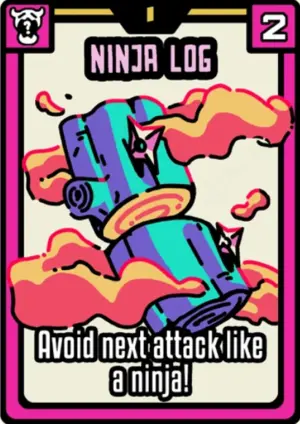
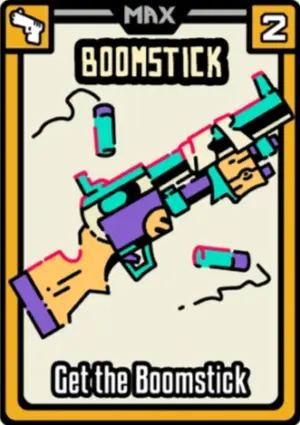
Countering your Friends
Countering is just as important as attacking! For as many cards as there are to play, there are just as many to counter with, so keep an eye out for what cards your friend uses in battle. Some basic counters are as simple as Bigger Mag if they play Smaller Mag, or Move Faster if they play Move Slower. If you have them in your hand, it should be fairly easy to level the field.
For example:
- If your friend plays the Albatross 21, play Small Head to make it harder for you to get headshot or Helmet to lower headshot damage.
- If they play Invisible, play a Poison card to reveal them for a bit.
- If they play Boomstick, play Tin Man or Energy Drink/faster movement to become immune to damage or to gain distance respectively.
Remember to watch out for what cards are being played against you in each match! If someone plays a card you’ve never seen before, it will show up grayed out in your deck builder. Use this to see what effects the card uses, and maybe add a card or two in order to counter it next time your friend plays it.
The more cards you have, the more opportunities there are to counter each card they may throw at you!
Pro tip: the Counter Card is a powerful trap card that can – you guessed it – counter any card. When you see someone play any trap card, play a useless card to get rid of the Counter Card’s effects.
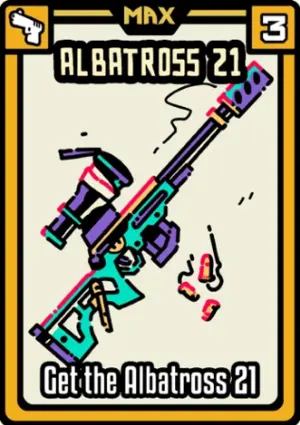
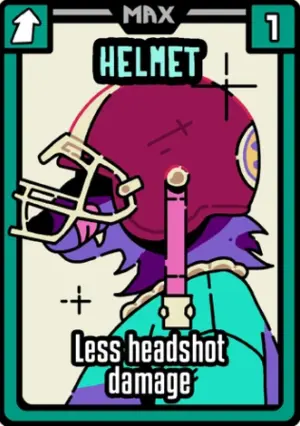
In Conclusion
Friends vs Friends is, at heart(less), a card based PvP game, so strategies and meta will change overtime as new cards and maps are introduced. The more you play, the more you’ll see viable strats and OP BS used by the community be made and then abandoned, but that’s OK. After all, not every card will be made equal and not every character will be balanced.
Lastly, the best strategy to use in every game is very simple: play fair, play with actual friends, and have fun!
